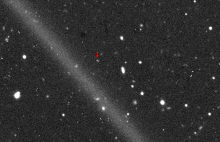S/2003 J 23
外观
 2003年2月,加法夏望远镜拍摄的S/2003 J 23的发现影像 | |
| 发现 [1] | |
|---|---|
| 发现者 | 史考特·雪柏等人 |
| 发现地 | 毛纳基山天文台 |
| 发现日期 | 6 February 2003年2月6日(成像) January 2004年1月(宣布) |
| 轨道参数 [2] | |
| 历元 17 December 2020年12月17日(JD 2459200.5) | |
| 观测弧 | 14.22 yr(5,193 d) |
| 半长轴 | 0.1649635 AU(24,678,190 km) |
| 离心率 | 0.3207567 |
| 轨道周期 | –2.17 yr(–792.00 d) |
| 平近点角 | 257.08447° |
| 轨道倾角 | 146.15464° (对黄道) |
| 升交点黄经 | 142.40639° |
| 近日点参数 | 295.73090° |
| 隶属天体 | 木星 |
| 物理特征 | |
| 反照率 | 0.04 (假定)[3] |
| 视星等 | 23.6[3] |
| 绝对星等(H) | 16.6[2] |
S/2003 J 23是木星的一颗外层天然卫星。它是夏威夷大学史考特·雪柏等人于2004年从2003年的影像中发现[4][1]。
S/2003 J 23的直径约2公里,在约792天的周期,以24,700,000公里的平均距离绕木星运行,与黄道成146°的倾斜度,沿逆行方向运行,离心率为0.321。
它属于帕西法厄群,此群的卫星是绕木星运行的不规则逆行卫星,距离在22.8到24.1 Gm之间,倾角范围在144.5°到158.3°之间。


这颗卫星曾被认为是失落的天体[5][6][7][8]。直到2020年末,雪柏和业馀天文学家凯利才分别再找到它[9]。2021 1月13日小行星中心在2011年1月13日宣布这颗再度发现这颗卫星的,而雪柏随后于2021年1月27日公布了他再发现的观测结果[10][2]。
参考资料
[编辑]- ^ 1.0 1.1 MPEC 2004-B81: S/2003 J 23 (页面存档备份,存于互联网档案馆) 2004 January 31 (discovery and ephemeris)
- ^ 2.0 2.1 2.2 MPEC 2021-B136 : S/2003 J 23. Minor Planet Electronic Circular. Minor Planet Center. 27 January 2021 [27 January 2021]. (原始内容存档于2022-11-17).
- ^ 3.0 3.1 S.S. Sheppard (2019), Moons of Jupiter, Carnegie Science, on line. [2023-04-15]. (原始内容存档于2019-04-24).
- ^ IAUC 8281: S/2003 J 23 (页面存档备份,存于互联网档案馆) 2004 February 4 (discovery)
- ^ Beatty, Kelly. Outer-Planet Moons Found — and Lost. www.skyandtelescope.com. Sky & Telescope. 4 April 2012 [27 June 2017]. (原始内容存档于2017-06-07).
- ^ Brozović, Marina; Jacobson, Robert A. The Orbits of Jupiter's Irregular Satellites. The Astronomical Journal. 9 March 2017, 153 (4): 147. Bibcode:2017AJ....153..147B. doi:10.3847/1538-3881/aa5e4d
 .
.
- ^ Jacobson, B.; Brozović, M.; Gladman, B.; Alexandersen, M.; Nicholson, P. D.; Veillet, C. Irregular Satellites of the Outer Planets: Orbital Uncertainties and Astrometric Recoveries in 2009–2011. The Astronomical Journal. 28 September 2012, 144 (5): 132. Bibcode:2012AJ....144..132J. S2CID 123117568. doi:10.1088/0004-6256/144/5/132.
- ^ Sheppard, Scott S. New Moons of Jupiter Announced in 2017. home.dtm.ciw.edu. 2017 [27 June 2017]. (原始内容存档于2017-06-10).
We likely have all of the lost moons in our new observations from 2017, but to link them back to the remaining lost 2003 objects requires more observations a year later to confirm the linkages, which will not happen until early 2018. ... There are likely a few more new moons as well in our 2017 observations, but we need to reobserve them in 2018 to determine which of the discoveries are new and which are lost 2003 moons.
- ^ Hecht, Jeff. Amateur Astronomer Finds "Lost" Moons of Jupiter. www.skyandtelescope.com. Sky & Telescope. 2021-01-11 [2021-01-11]. (原始内容存档于2021-11-09).
- ^ MPEC 2021-A168 : S/2003 J 23. Minor Planet Electronic Circular. Minor Planet Center. 13 January 2021 [13 January 2021].
